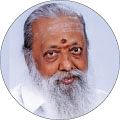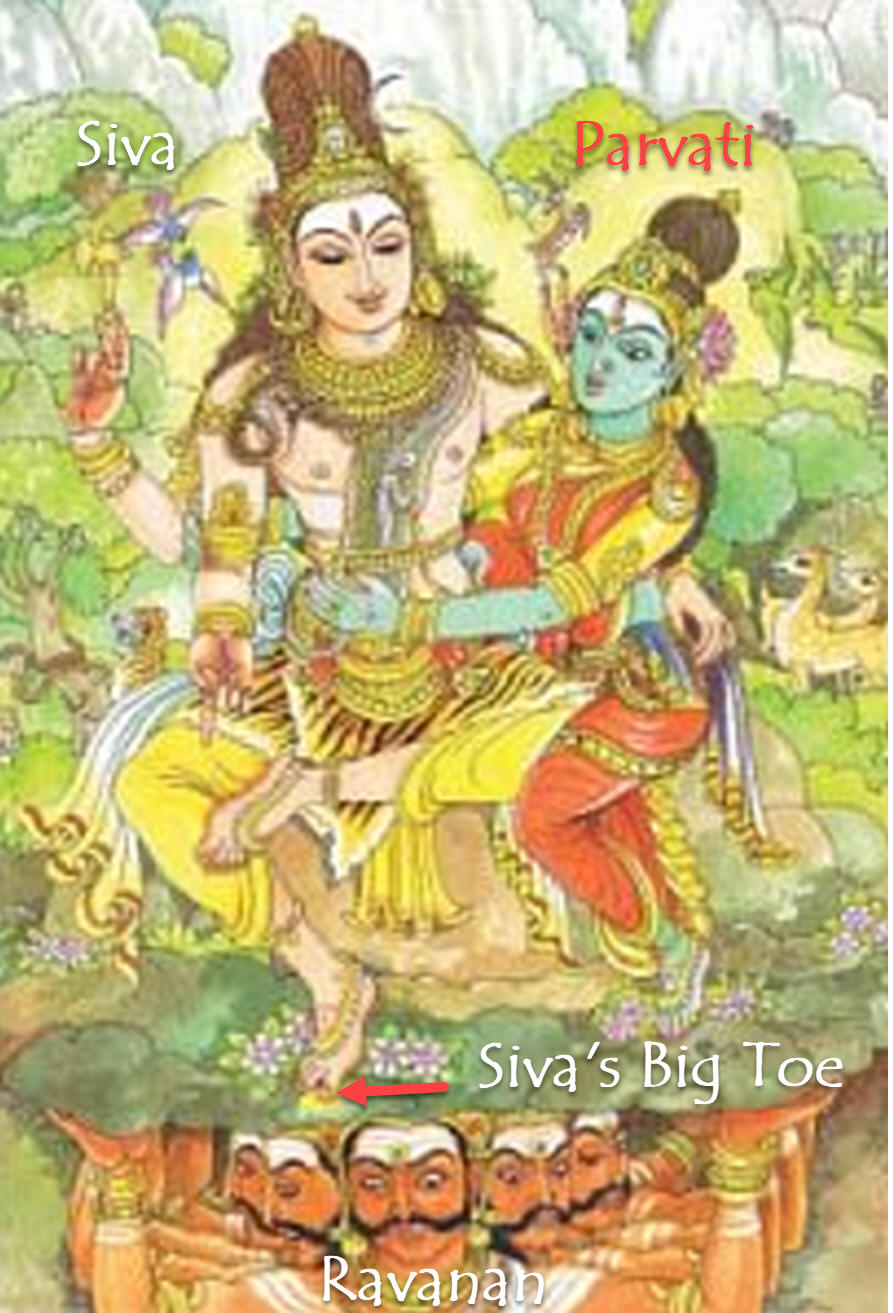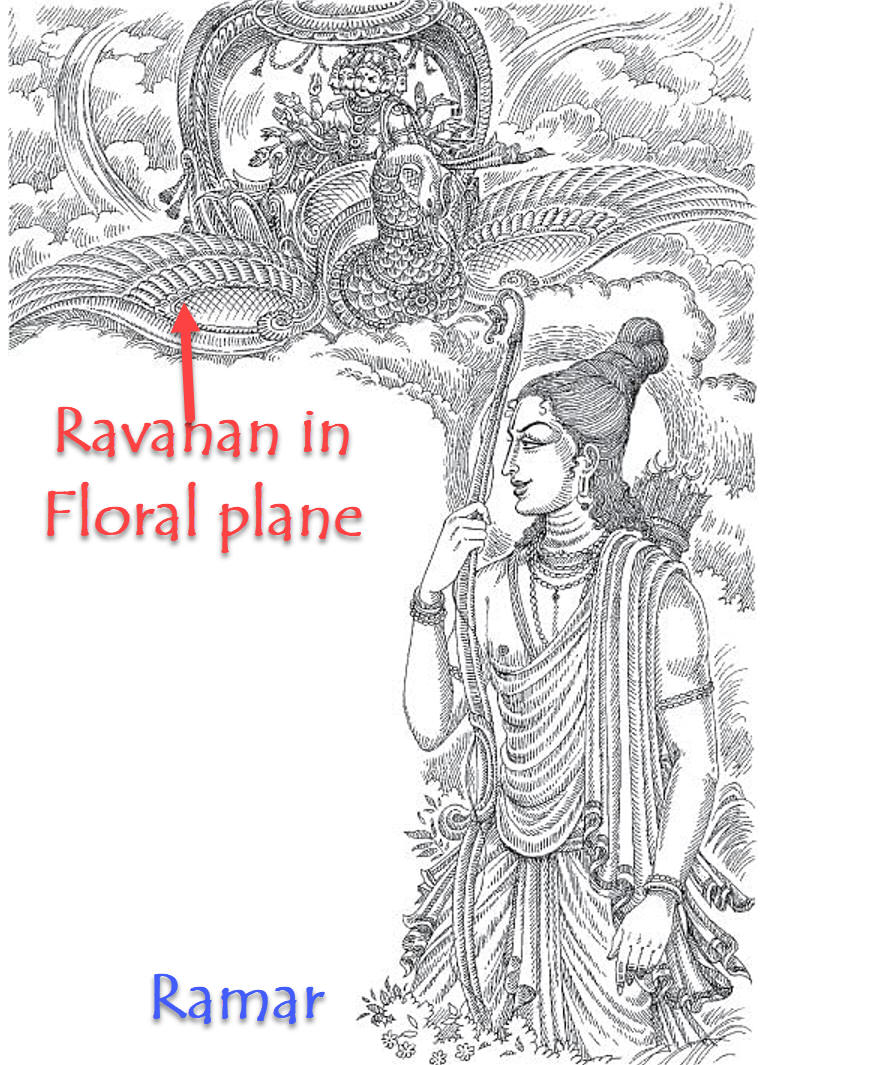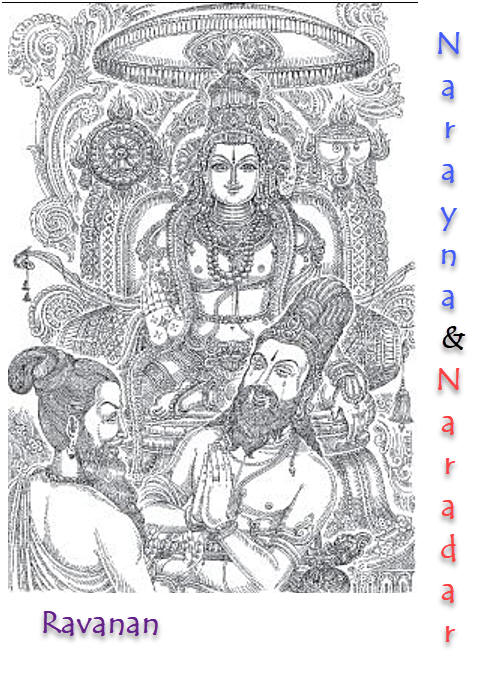Published:10 Jun 2013 8 PMUpdated:10 Jun 2013 8 PM Sakthi Vikatan
Vikatan Correspondent
 Wordsmith Balakumaran
Images: Padmavasan
Wordsmith Balakumaran
Images: Padmavasan
1. Nāradar had the Sakthi to visit all the worlds but had a particular
liking for the earth. That the earthlings celebrate Narayana and the
dharmic path was a matter of joy for him. He was in search of the
powerful and the people with Arrakar Guna (Demonic qualities).
2. Naradar came to know that Ravana was roaming the world on his
Pushpaka Vimānam (Floral airplane). His Vimānam could not cross the
Himalaya mountains. He went higher and faced another mountain come in
his way.
Air turbulence made the plane unstable. With a thought to split the
mountain into two halves, he got down from the plane. He put his hand in
the base of the mountain and tried to lift the mountain.
3. Śiva was tranquil sitting on the Kailas mountain, which shook
because of Ravana's lift. Pāravati ran towards him and embraced him.
Śiva opened his eyes. "O, it must be Ravanan. Just wait." Śiva pressed
the mountain with his thumb, and Ravanan's shoulder cracked from the
mountain's crush, and his body trembled. The mountain leaned on him.
Ravanan was in a fix. He employed many maneuvers in futility. Ravanan
understood he was nothing before Śiva. He cut one of ten heads, removed
a tendon from his body, made it into a string and the body into a Yāzh
(Harp), and played Sāma Gānam to please Śiva.

4. 'Adadā! Ravanan is clever, discovered what pleased Śiva, and played
the Sāma Gānam to induce mercy from Śiva. Sāma Gānam is a unique musical
composition. Visuddha Chakra is in the throat area, the vibrations of
which (Voice box) spread throughout the body. More important, the
vibrations spread to the brain, the eyes, the ears, and the Nandhi in
the center of the brain. That part of the brain is pearl-like and of the
size of an orange seed, which is the repository of Dravam (liquid). The
liquid helps people keep their head upright and speak. Ravanan
concentrated on Nandhi, later Visuddha Chakra, and sang the Sāma Gānam
by joining the Nandhi and the Visuddha Chakra.
5. Sāma Gānam is like a deep ocean with rolling waves from the north
to the south. The sound of the earth is in Sāma Gānam, which is spread
all over the earth. It is a certainty that singing the heart melting
Sāma Gānam makes Śiva pleased. Nāradar present in that location at that
moment was immersed and lost in the music. Śiva became soft-hearted,
6. Śiva addressed Ravanan saying, "You sing wondrously. You are so
talented and so inclined to please me. Why do you engage in demonic
activities? What do you want? Ask me." All the celestials were eagerly
waiting to know what Ravanan would ask.


7. Nāradar smiled and was sure Ravanan would ask him for forbidden
things.
Ravanan said to Śiva, "I must have the most astonishing stamina. I
should not die in the hands of celestials, demons, or heavenly musicians
(Devas, Asuras, and Gandharvas) and animals, birds, fish, and the like.
Śiva gave the requested boon.
Ravanan forgot the man as his possible killer. He thought a man could
never be his killer. The boon was a weak one in that sense.
8. Śiva let Ravana free from the pressure with his thumb. Ravanan left
after paying homage to Śiva. Gaining superlative powers, Ravanan
oppressed celestials and the nine planetary lords (he nine planetary
lords who govern each year, viz., rājā, mantiri, cēṉātipati,
caciyātipati, tāṉiyātipati, arkkātipati, mēkātipati, racātipati,
nīracātipat). Ravanan subdued all life forms with his stern look. The
demons prospered and ruled the world.
9. Nāradar appeared before Ravanan. "Adēyappā! What a clever person
you are. How easily you received Śiva's mercy? Knowing what boons Śiva
will give you, you ignored physical pain, sang Sāma Gānam like a
Tapasvin, and obtained the boons. Ravana! Did you get these boons to
vanquish the celestials? Are they equal to you? Should you not fight
your equals?"
10. Ravana rebuked Nāradar, "Who is equal to me?"
Nāradar: "Yamadharman (god of death) is so powerful that he tortures all
life forms and takes them by force."
Ravanan: "Is that so? I am going to him now. Ravanan was on his way to
Yama, and in an instant, Nāradar was in Yama's presence.
Nāradar: Neither
your noose nor your staff is capable of punishing or subduing Ravanan.
You better yield to him. Back down. That will be of use in the future."
But Yama did not want to lose face and fought Ravanan. Ravanan attacked
and tortured Yama and his attendants. Yama lost the battle.
11. Ravanan released many bad people to live on earth in comfort. The
released cruel people took rebirth on earth and caused more cruelty. The
earth was in turmoil. Is it not right that Ravanan should not feel
invincible? Therefore, Nāradar went to Ravana again.
12. Ravanan addressed Nāradar, "You praised Yama. He could not take
the heat even for a few moments. Tell me who else you have on your
mind." Nāradar thought of giving him a suitable reply.
13. Nāradar told Ravanan, "There is a Gandharva city. The city's
people in praise and love with Narayana, his worshippers, his servitors,
and his Bakthas assemble in a place and perform Pūja to him. They are
mighty. No one can win over them. They know it well. See whether you can
do something to them." Saying such challenging words, Nāradar instigated
Ravanan, who immediately left for the city.
14. His Pushpa Vimānam went towards the splendorous city, and unable
to go beyond it, it descended on its own accord. Ravanan disembarked
from the plane and saw a bevy of beautiful girls with immense strength
playing nearby. Well-built muscular men were working there. Ravana went
towards the girls. The girls took one look at Ravana and surprise seized
them. They wondered among themselves who that stranger was. They pinched
Ravana, beat him lightly, pushed him down on the ground, lifted him, and
told him to play with them. They said, "catch me if you can." And they
ran. They picked him up and dropped him. Ravanan played hard with them
and became tired. Seeing him so tired, they picked him up, dropped him
by the lakeshore, and said, "we have other things to do, and we played
enough with you." Ravanan picked himself up and stood.
15. Ravanan: I could not tackle these youngsters under the support of
Vaikuntavāsan (Vishnu). I made a mistake playing and fighting with them.
The servitors of Narayana are stronger than anyone I know. I wish I
could subdue them. I must conquer Narayana.
He uttered the Narayana Mantra to that end.

16. Ravanan decided that Narayanan was his equal for a fight. When am
I to fight him? Where is Narayanan?
17. Nāradar laughed out loud and said, "all things come to an end.
Ravana, you will see your end, when Narayana will take birth on earth.
You chant his name. You will attain Mukti at his hands. Your death is
certain. Your boons, your ego, your cleverness will be of no use. You
will face ignominy before you die." But these words did not register
with Ravana.
18. Having the precognition of the world and the events, Nāradar
foretold the future, uttering Narayana's name and wandered around in the
world.
19. Nāradar planned the death of Ravanan, who obtained the boon from
Śiva that no one could kill him, but Narayana would be his killer.
Nāradar cognized and wrote of his death at the hands of Narayana. Srimad
Narayana took birth in the name of Sri Ramar, expressly to kill Ravana.
Ramar went with Visvamitrar and killed Thatakai and entered a jungle
life leaving his kingdom and his father. Kaikeyi extracted a promise
from her husband to appoint her son Bharata to the throne and send the
elder Rama to the forest exile. This event's ultimate object was to kill
Ravana. Ramar took his wife and brother on his exile. Nārada Maharishi
predetermined the day and time of death of Ravana.
20. Nāradar never claimed primacy in Ramayana. If you look at Nārada
Avataram, one will see that he caused the failure, as his life's work,
to the perpetrator whenever the latter's ego got the best of him.
Nāradar never wielded a sword or bow and arrow in the war against the
evildoers. His voice was sedate and musical like that of his harp.
Wherever haughtiness reigns supreme, Nāradar went there to speak and
advise. Nāradar gave this world the gift of Ramayana to the world. If
not for him, there would be no poems.